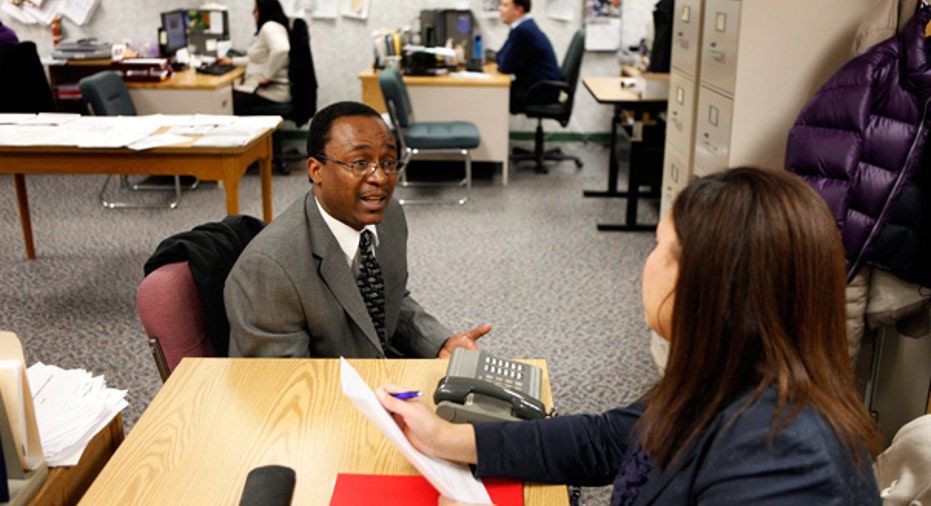Seven Tricks to Help Get a Job Now

With nearly 14 million Americans out of work and the unemployment rate sitting at 9.1% in July, finding a job in todays labor market is no easy feat.
Of those unemployed, the labor department reports about a million of them are not actively looking for work because they believe no jobs are available for them. But experts say the first steps to snagging a job is staying positive and be open minded to different opportunities.
You need a job now. Don't turn something down because it's not perfect, says Bruce Hurwiz, president and CEO of Hurwitz Strategic Staffing. Full-time employment may be the goal, but the aim is to be able to pay the bills. In this market people have to be realistic.
Describing the job market as anemic is an understatement, but there are tricks job seekers can do to increase their chances of being hired. Here are seven experts tips to getting hired:
Go after temporary and freelance work in your target field. Research by The Human Capital Institute indicates that one third of the U.S. work force is now composed of contract workers as corporations cut permanent staff to reduce staff. This pool of workers is growing at more than twice the rate of the full-time work force.
Temporary, contract and freelance work can lead to a permanent gig, but at the time, it helps pays some bills and build a portfolio, Hurwiz says.
Narrow your search. Casting a wide net during your search might not bring in more fish since you won't have the time to carefully craft customized resumes and cover letters for the positions.
Applying to job openings that truly match your skills and interests will increase your odds of getting the right job.
Become a thought leader online. Blogging and participating in LinkedIn group discussions increases your online visibility and lends credibility.
Sharing relevant information with colleagues and potential hiring managers helps position you as someone who cares about the industry and is insightful and well-connected in that particular area, says Dana Leavy of Aspyre Solutions, a career consulting firm. Who wouldn't want someone who demonstrates that level of creativity, ambition and connectivity on their team?
Seek the help of a headhunter. If your profession uses recruiters, such as management or IT, give a couple firms in your area a call. Organizations pay them good money to find the right person. That might be you, says Laura Evenson at Bersin & Associates, a research and consulting firm.
Use your network tactfully and contact workers on the inside. Research employees in the company you want to work for and get to know them. And dont be afraid to ask them if it is possible to schedule an informational interview with the person in charge.
By making direct contact with hiring managers, you bypass the chance of your resume getting overlooked or lost in the black hole of an online applicant tracking system.
Many times [employees] will earn a referral bonus if they recommend you, says Bill Humbert, founder of RecruiterGuy.com and recruiter consultant.
But be sure to reach out it in a non-annoying sort of way, warns David Lewis, president and CEO of Operations, Inc., a human resources consulting firm. That means avoiding incessant contact and being tactful in your approach to get to know employees.
Get creative. With hundreds of applicants potentially vying for one job, it's important to stand out and leave a good impression.
Take Chris Kimball, a former jobhunter who wanted a job in advertising and took the obligatory post-interview thank-you letter as a chance to display his creative prowess:
Following the interview I purchased a dozen or so generic postcards, the messages went something like this: 'Hey John, we're having a great time here...P.S. I hear you are thinking about hiring that Chris Kimball guy. You should. I hear he's great. I mailed the postcards to all my friends around the world and had them mail the postcards back to [the boss]. Upon receiving the first postcard, [he] was a bit confused ... 12 postcards later, he called me and I got the job.
Clean up your online life. It might seem like a non-brainer to most, but be sure to take down public photos you wouldn't want your boss to see; remember that every Tweet or status update represents your brand.
This is the part where people figure out their message and get it out there. At minimum you need a website. Head to WordPress.com to get a free one sorted out in 15 minutes or less and consider paying for hosting so its under your control, says Beth Campbell Duke, principal of Campbell Duke Personal Branding. But your website is the only piece of online real estate you own and control. Your web address goes on everything: business card, resume, social media accounts, etc. Your web presence has your back when you take your networking offline.



















